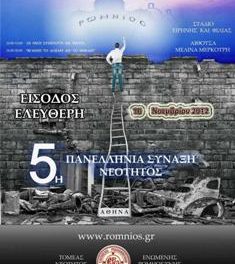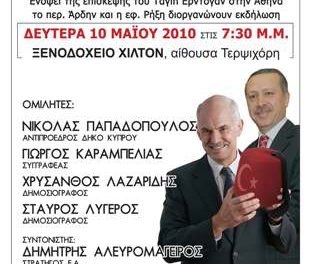The Center for Transatlantic Relations
at the Paul H. Nitze School of Advanced International Studies
Johns Hopkins University
EU Center of Excellence Washington DC
in cooperation with
The Onassis Foundation (USA)
and
The Embassy of Greece
Invite you to a discussion on
“Towards a New Architecture for Politico-Military Security in Europe: The Role of the OSCE”
with
Petros Efthymiou
President of the OSCE Parliamentary Assembly
MP Hellenic Parliament
P. Terrence Hopmann, Moderator
Professor of International Relations and Director of the Conflict Management Program, SAIS
When: Thursday, April 21, 2011
Where: Room 500, 1717 Massachusetts Ave., N.W., Washington DC
**RSVP by email to transatlanticrsvp@jhu.edu with “April 21 OSCE” in the subject line.
Petros Efthymiou serves as President of the OSCE Parliamentary Assembly in 2011. The Parliamentary Assembly is composed of 320 parliamentarians from the 56 OSCE participating states, established both to keep parliamentarians informed about the work of the OSCE and also to provide an opportunity for members of parliament to make their input into deliberations on the major issues facing the OSCE region extending from “Vancouver to Vladivostok.” Much of its traditional work includes participation as election observers in conjunction with the OSCE’s Office for Democratic Institutions and Human Rights. Mr. Efthymiou is a member of the Greek parliament, a former Minister of Education and Religious Affairs, and has served as well in the European Parliament. He is a journalist by profession.
His talk will focus on OSCE efforts to consider new architectures for political and military security in Europe. In part in response to proposals from Russian President Dmitri Medvedev to create a new architecture for European security, the OSCE has begun to re-examine its own place in this architecture. This process was begun under the Greek OSCE chairmanship in 2009 with a conference of OSCE foreign ministers in Corfu, continued in 2010 under the Kazakh chairmanship with a follow-on conference in Almaty, Kazakhstan. The overriding question is whether Europe should start anew in creating a security structure that might largely supplant the OSCE, as implied by the Russian proposal, or can and should the security functions of the OSCE be adapted to respond to current security challenges facing the continent without necessarily creating a new institutional structure?


















